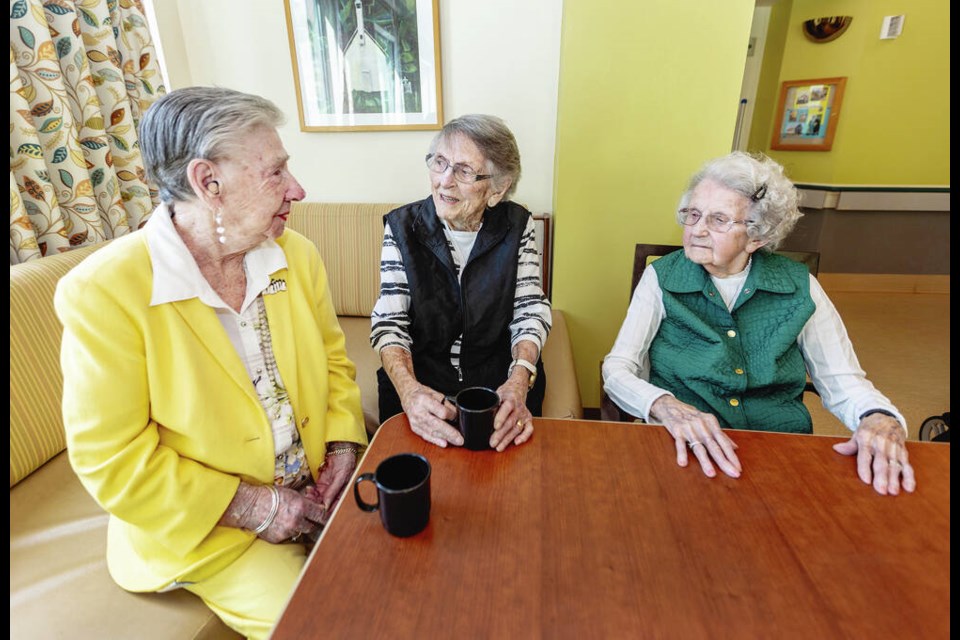As a teenage aircraft mechanic in the Second World War, Ronnie Bennett-Butcher had to go on test flights in whatever plane she worked on.
The most memorable was a flight in a Wellington aircraft with a pilot from New Zealand, who decided he would show her some fancy manoeuvres.
“He flew under London Bridge,” Bennett-Butcher, who turned 99 on Friday, said with a smile. “Crazy.”
The stunt did not go over well with military officials. Afterward, the pilot was reassigned and Bennett-Butcher was reprimanded for not wearing a parachute.
Bennett-Butcher, one of three women who live in Veterans Memorial Lodge who sat down to recount their wartime experiences this week, had followed her father’s lead and joined Britain’s Royal Air Force as soon as she could, at the age of 17. There, she earned her mechanic’s certification.
“There weren’t that many of us in the entire air force,” said Bennett-Butcher, whose family was Canadian but living in England.
She said her father was against her being in the air force at first, but grew to be proud of his daughter’s accomplishments.
Bennett-Butcher said that mechanical work came naturally to her. “I liked taking things apart and putting them back together,” she said with a laugh.
She was in the air force for the duration of the war and stayed on after it ended, becoming a drill instructor.
Bennett-Butcher said she worked only on planes and never branched out to other things, like trucks and cars.
“I could have done because it’s all the same — induction, compression, power and exhaust.”
Pam Belanger, 99, meanwhile, was one of more than 50,000 women who served in Canada’s armed forces during the war.
Stationed in Vancouver with the Pay Corps, Belanger helped soldiers sort through their finances before they headed to the war.
She especially remembers one young man whom she had helped figure out what to do with his assets, all of which he wanted to give away.
“I told him: ‘You know what, you won’t have anything left’,” she said. “His answer was ‘I won’t need it.’ ”
She took that to mean he was ready to die in battle.
“It was sad,” Belanger said. “It was right at the beginning of the war when it was the roughest. I would give anything to know if he made it back.”
She was recently presented with her Canadian Volunteer Service Medal and 39-45 War Medal, which she had never received during the war because she left the service abruptly after getting pregnant.
Her husband, Jack, was a fellow member of the Pay Corps.
She was given the medals in February in a ceremony at the lodge.
Iona Kennedy’s wartime job was working as a radio operator based in Ontario, as well as being a member of the military police.
Radio operators were not allowed to divulge the information they received and transmitted, said Kennedy, 101. “We were sworn not to tell what we were listening to.”
She said it was an honour to contribute to the war on the home front.
The women are among about 100 veterans at the lodge, which is home to a total of 225 residents.
Veterans are being celebrated this year by Broadmead Care, which operates the lodge, since 2024 marks both the 80th anniversary of D-Day — coming up Thursday — and the 100th anniversary of the Royal Canadian Air Force.
A series of stories about the lodge is running in the Times Colonist, and will be compiled in a special insert in the paper next weekend called “Heroes Among Us.”
The idea is to inspire donations to a fundraising initiative at the lodge called Rooted in Care, which has a $600,000 goal to help fix up the nine courtyards and garden areas where residents can spend time outside.
Around $130,000 has already been collected and used to complete work on three of the courtyards.
• Find about more about veterans at the lodge at .
>>> To comment on this article, write a letter to the editor: [email protected]




